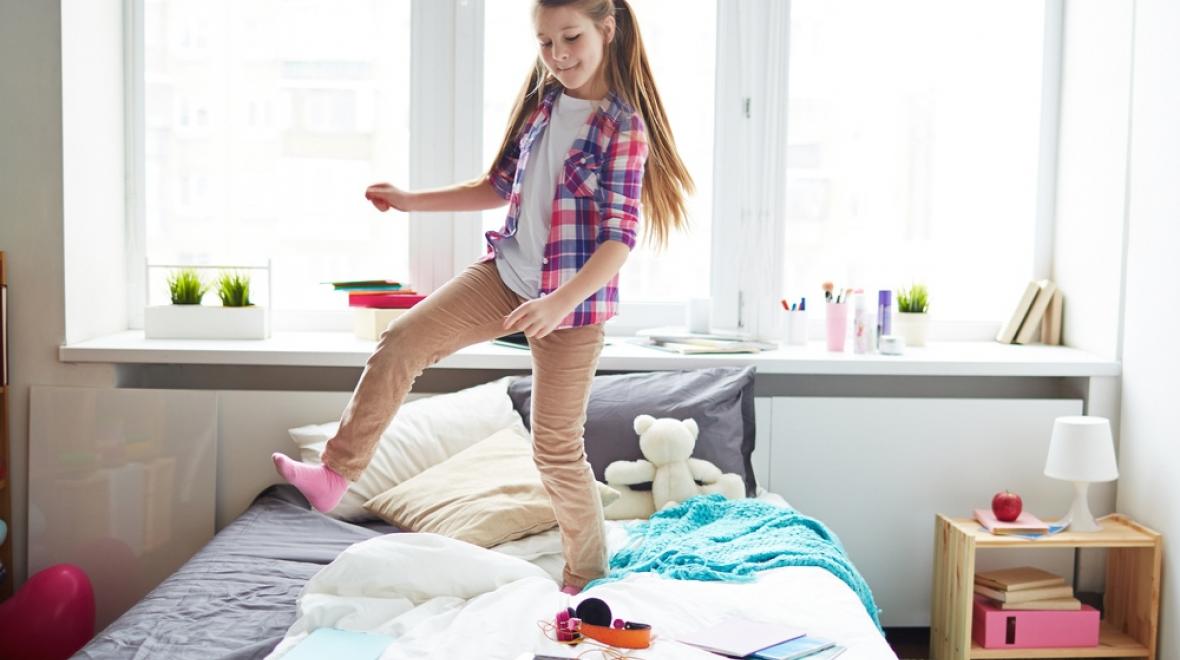
Our teens are back in their rooms and I am prepping dinner in the kitchen when my husband comes home from work. I gesture to the kitchen bar. It is covered with our daughter’s stuff — hairbands, bobby pins, ear buds, iPod shuffle, textbooks, notebooks, binders, laptop, journal and the current book she is reading. Her messes used to stay in her room but increasingly, they have claimed our family living space.
“I’m done.” I say. “It’s time for The Talk.”
I have a long-standing history of straightening up after my daughter. As a busy, creative-type, she had never been neat as a child, and is even less so as a teen. When she was younger, I would plow through her messy room. After she left for school every morning, I felt compelled to pick up dirty soccer clothes, a crusty bowl from the morning’s oatmeal, a random headband lying in my path. I would make piles. I’d throw her comforter over the sheets as I walked out the door, so the bed at least looked made.
But really what I wanted was for her to clean up after herself. Wary that my interventions were only enabling her messy habits, I made weekly checklists in an attempt to get her to uphold a minimum standard of neatness on her own.
This ushered in a new type of tug-of-war between us: It was on me to enforce the different methods I kept introducing. She would improve, but then life would accelerate and she would regress with full force. I would too. I stepped back in and tidied up. It was a tiring see-saw. Not only that, I grappled with guilt because I felt like a pushover and also smarted from the additional work I was absorbing.
We talked. I cajoled. We argued. I nagged. But mostly, I bit my tongue and unloaded my frustration on my journal. I was having the same conversations over and over again in my head. My 13-year-old daughter stashes clothes under her pillow! And it’s only a few steps in one direction to her closet, a few steps in the other to the dirty clothes hamper. Things disappear in her bed! She was worried to death over a lost watch, which she later found — in the folds of her sheets.
I had felt it my parental duty to foster the maxim that tidiness is a foundational life skill in my child, because right or wrong, I wondered if her chances for a happier, more successful future would be hampered by a chaotic environment. “There are long-term benefits to keeping a tidy space,” I explained. For myself, it leads to greater productivity and reduces the odds that I’ll misplace things. I thought it was a good conversation, but — nothing.
I blamed myself for not effectively instilling this value in her. She was demonstrating that it was possible to be a solid, well-adjusted kid and successful student without being neat. She was as amazing as she was messy and this combination challenged my categories.
After I pointed out the mess in the kitchen, my husband didn’t think we needed to talk to her. He argued that she was navigating the burdens of a heavy academic load, college applications plus athletics and teenage relationships. A lecture on tidiness was a refusal to see beyond the messes to what mattered most, our daughter.
“Laugh it off!” he said gently. “Focus on enjoying the daughter we have. She’ll be out of the house in under a year.” Off to college, scattering her messes to uncharted territories. My husband’s words encouraged me to reconsider my position and then to let go, once and for all. I had started doubting my hell-bent mission to make my daughter a neat person years earlier, yet my internal agitation had persisted.
I had started doubting my hell-bent mission to make my daughter a neat person years earlier, yet my internal agitation had persisted.
Once I separated out my sorry sense of failure as a mother, I could better ask, why did this matter so much to me? If this was one area she was getting wrong, I realized there were hundreds she was getting right, maturing into a thoughtful young woman despite my private agonizing over her messy habits.
My efforts to alter her in this one arena were impeding my pure enjoyment for who she was. Instead of trying to fix her, I needed to accept that, though she was my daughter, she was unique — a completely different person than me. This issue of messiness was my issue, not hers, and the condition of her room didn’t make me a bad parent just as it didn’t make my daughter a bad person.
Once I stopped trying to change my daughter’s messiness, I saw her differently. I loved her more freely with fewer judgments flashing through my mind.
I admit, I did start straightening her room again, but this time with love racing through my veins, not the obsession of a reformer. During the summer between high school graduation and college she worked as host at a nearby restaurant and often closed, arriving home near midnight.
Feeling the pangs of her detaching, I would wander into her ransacked room in the evenings, tip-toeing over her stuff to reach her blinds and shut out the dark. I switched on her bedside lamp. I straightened her never-made bed and then folded it down, a perfect angle. I carefully retraced my steps, turning off the overhead light. I softly closed the door. I didn’t tidy it completely, but I let her know I was there with a few little touches.
We never spoke about it until we were hugging goodbye in front of her college dorm early September.
“I love you!”
“I know,” she said. “You showed me every time you made my room cozy and ready for me after work.” In front of me was an independent-minded, young woman and I regret how long it took me to regard her messes as a whimsical part of her, adding to her depth and complexity as an individual. Today, her signature messes are gone.
I miss them.
Editor's note: This article originally appeared on Grown and Flown.











